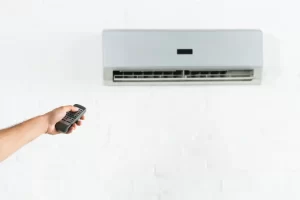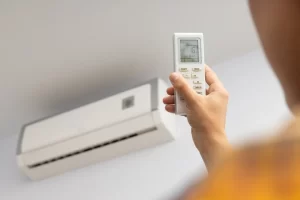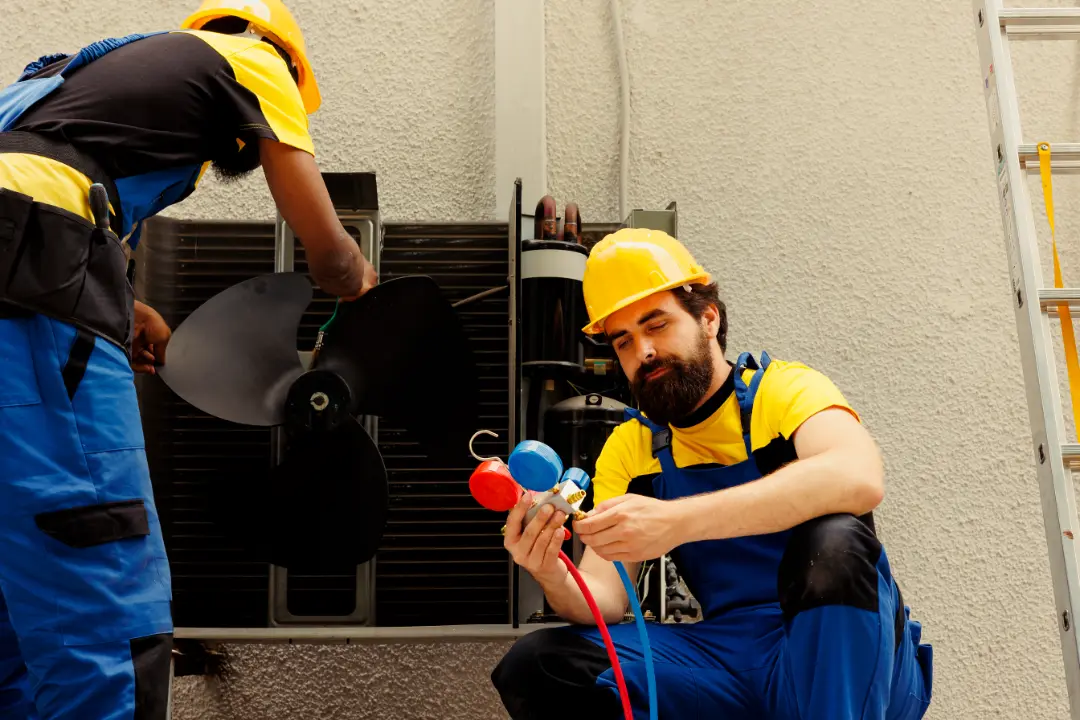Wondering what size split system do I need? Choosing the right size is essential for comfort and energy efficiency. This guide will help you understand how to select the perfect air conditioner by considering factors like room size, insulation, and sun exposure. Read on to ensure you get the optimal cooling for your space.
Key Takeaways
- Correctly sizing a split system air conditioner is vital for optimising energy efficiency, reducing costs, and ensuring indoor comfort.
- Factors influencing air conditioner size include room dimensions, insulation quality, sun exposure, and heat generated by occupants and appliances.
- Consulting professionals for accurate sizing and installation enhances the unit’s performance and protects warranties, leading to long-term savings.
Why Split System Size Matters
Selecting the correct size for a split system air conditioner is essential for optimal performance. An appropriately sized unit affects energy usage, lowering operational costs and maximising cooling efficiency. Beyond efficiency, your comfort and air quality are directly tied to the unit’s size, impacting indoor comfort levels and air quality.
An oversized air conditioner might initially seem like a good idea, promising powerful cooling. However, it can lead to inefficiency, higher costs, and even discomfort. Conversely, an undersized unit will struggle to cool the space, leading to higher energy consumption and reduced comfort.
Let’s break down these impacts further.

Impact on Efficiency
Efficiency is key to a well-functioning air conditioning system. An appropriately sized unit can significantly lower energy waste and reduce electricity costs. An oversized air conditioner consumes too much electricity and reduces efficiency by cooling the space quickly, causing frequent on-off cycling. This wastes power and leads to higher running costs.
Conversely, an undersized air conditioning unit forces the compressor to work overtime, leading to quicker wear and tear, higher bills, and reduced efficiency. The effectiveness of an air conditioning unit directly correlates with the size of the room.
Cost Implications
Due to inefficiency, oversized air conditioners result in increased initial costs and higher operational expenses. Buying a unit that is too large can also escalate ongoing energy costs.
The financial implications of incorrect sizing are substantial, impacting both your initial investment and long-term savings.
Comfort and Air Quality
Comfort and air quality are critical aspects of indoor living. A properly sized air conditioning system contributes to a stable indoor temperature and improved air quality. Selecting a unit that is too small for a space can result in insufficient cooling, causing discomfort and inconsistent room temperatures. This issue is especially pronounced in larger rooms, where an underpowered unit may leave some areas warmer than others.
An underpowered air conditioner will struggle to reach the desired temperatures, causing discomfort and increasing system wear. Conversely, an oversized air conditioner might cool the room too quickly without adequately dehumidifying the air, leading to a damp and uncomfortable environment.
Therefore, the key to comfort and air quality lies in balancing cooling power with cool air room requirements.
Calculating the Right Split System Size
Calculating the right size for a split system air conditioner is essential for optimal cooling and energy efficiency. Factors to consider include room dimensions, insulation quality, sun exposure, and additional heat from occupants and appliances.
An air conditioner size calculator can help determine the suitable cooling capacity based on these factors. Consulting a professional ensures all room characteristics and needs are considered, resulting in better unit performance.
Measure Room Dimensions
Accurate room measurements are vital for determining the appropriate air conditioner size to ensure optimal performance. Begin by recording the length and width of the floor space. For instance, a room measuring 5 meters by 4 meters has a floor area of 20 square meters. Additionally, consider the height of the room. High ceilings increase the air volume that needs to be cooled, affecting cooling needs.
Be precise when measuring and include all areas that need cooling. If your room has alcoves or unusual shapes, break it down into smaller sections and calculate the area for each. Adding these areas together will give you the total floor space your air conditioner needs to cover.
Accurate measurements ensure you choose the right size unit, avoiding the pitfalls of over or underestimation.
Consider Insulation and Sun Exposure
The quality of insulation in your home significantly impacts the cooling load. Good insulation reduces the cooling load, meaning your air conditioner doesn’t have to work as hard. Well-insulated homes typically require lower-capacity units to maintain comfort, while uninsulated homes may need more powerful units to compensate for increased heat retention.
Windows and their exposure to sunlight can also influence the cooling capacity needed for efficient climate control. Significant heat gain through windows necessitates a larger air conditioning unit. If your room has windows with poor thermal performance, you might need to increase the unit size by a couple of kilowatts.
Room orientation and insulation quality significantly affect the required air conditioner size.
Account for Occupants and Appliances
The number of occupants in a room directly affects cooling requirements, as each person generates heat that increases the cooling load. For rooms with more than two occupants, add 600 BTUs to the cooling capacity for each additional person. High occupancy rooms, such as those used for gatherings or work, typically require more cooling capacity to maintain comfort.
Appliances such as computers and kitchen equipment also contribute to heat output, necessitating larger air conditioning systems in spaces with multiple devices. Kitchen areas typically require an increase of 4,000 BTUs in cooling capacity due to heat-generating appliances.
Ceiling height and insulation quality also influence the appropriate size of a split system air conditioner.
Recommended Split System Sizes by Room Type
Choosing the right size split system air conditioner depends on the type and size of the room. For small rooms (up to 20 sqm), medium rooms (20-40 sqm), and large rooms (40+ sqm), specific recommendations ensure optimal performance and comfort.
These guidelines aid in selecting the right size air conditioner for different room types, ensuring a comfortable indoor environment across various spaces.
Small Rooms (Up to 20 sqm)
A 2.5kW air conditioner is ideal for cooling spaces up to 20 square meters. These split systems are easier and quicker to install as they don’t require extensive ductwork.
This size of split system air conditioner ensures adequate cooling for small rooms and simplifies installation and maintenance.
Medium Rooms (20-40 sqm)
Medium-sized rooms generally require an air conditioner with a capacity ranging from 2.5 kW to 5 kW. A 5 kW unit is recommended for medium rooms, which cover areas up to 40 square meters.
Choosing the right size air conditioner is crucial for comfort and efficiency in medium-sized rooms.
Large Rooms (40+ sqm)
For large open-plan living areas over 40 square meters, an air conditioning unit with a capacity of 5 kW to 9 kW is advisable. For spaces exceeding 60 square meters, an 8 kW system is appropriate for optimal temperature control.
Choosing the right air conditioning capacity is vital for maintaining comfort in large open-plan living areas and commercial spaces.
Comparing Split Systems and Ducted Air Conditioners
Ducted air conditioning units are often more effective for cooling entire homes simultaneously, providing consistent temperatures across various rooms. They are generally better suited for larger homes.
However, split system air conditioners offer flexibility and are ideal for cooling individual rooms or areas. When choosing an air conditioning system, consider your specific needs, including cost, maintenance, and the number of rooms that need cooling.

Cost Comparison
Initial installation costs for ducted systems can be significantly higher than split systems. Split systems have lower operating costs compared to ducted systems, especially in smaller spaces.
Cost considerations are crucial when choosing between split systems and ducted air conditioners, affecting both initial expenses and ongoing operating costs. Selecting the right system based on financial implications ensures efficient investment and long-term energy savings.
Installation and Maintenance
Ducted systems require careful planning and may not suit homes lacking sufficient space for ducting. They also require more complex installation and maintenance, often needing specialist services.
Smartway Air Conditioning offers comprehensive services, including expert installation by certified professionals. Differences in installation complexity and maintenance requirements highlight the importance of selecting the right system for your home.
Suitability for Different Home Layouts
Selecting the right air conditioning system is crucial for ensuring optimal comfort and energy efficiency in different home layouts. For small rooms (up to 20 sqm), split systems typically range from 1.5kW to 2.5kW. Medium rooms (20-40 sqm) generally require systems with a capacity of 3.0kW to 5.0kW. Large rooms (40+ sqm) may need capacities starting from 6.0kW, depending on layout and insulation.
Split systems offer flexibility for installation and zoning based on room layouts, while ducted systems provide unified climate control throughout larger areas.
Professional Sizing and Installation Services
Consulting a professional is the most reliable method for determining the correct air conditioner size. Size charts alone cannot guarantee accuracy. Consulting with an air conditioning specialist ensures the best determination of cooling capacity requirements.
Professional installation protects the warranty and ensures proper unit placement. Licensed installers reduce the risk of damage and ensure compliance with safety standards.
Benefits of Professional Assessment
Consulting an air conditioning expert ensures accurate size selection by considering all relevant factors. Incorrect sizing may render warranty claims ‘not fit for purpose’.
SmartWay Air Conditioning team of certified HVAC professionals offer expert installation for all types of air conditioning systems. Our experts can tailor solutions to your home’s specific needs, ensuring optimal performance and longevity.
Experience Year-Round Comfort with SmartWay Air Conditioning Sydney
SmartWay Air Conditioning is Sydney’s trusted and reliable company for premium air conditioning services. With over 30 years of experience, our expert technicians specialise in installation and repairs for both residential and commercial properties.
We are fully licensed and insured, ensuring your peace of mind with every service. We deliver energy-efficient solutions tailored to your needs.
Your comfort is our top priority. Whether you need reliable air conditioning repairs or a completely new system installation, we promise top-quality results that keep you comfortable year-round. Contact us today for a free quote.
Affordable, Reliable, and Always Available
At SmartWay Air Conditioning Sydney, we offer affordability without sacrificing quality. Our transparent pricing ensures you receive the best value, whether it’s a simple service call or a full system installation. No hidden fees—just exceptional service at a price you’ll love. We install all makes and models of air conditioners, ensuring a perfect fit for your home or business.
Available 24 hours a day, our team is here whenever you need us. We’re dedicated to ensuring your comfort, whether it’s a scorching summer day or a chilly winter evening. Get in touch with us now for a free estimate.
Energy Efficiency and Running Costs
Choosing the correct size air conditioner is crucial for long-term efficiency, low maintenance needs, and cost savings. An oversized unit wastes power, while an undersized unit struggles to provide effective cooling, increasing energy consumption.
Proper installation by professionals maximises energy efficiency and lowers utility costs over time. Understanding and managing these aspects can significantly reduce your electricity bills and improve the unit’s efficiency.
Understanding Energy Ratings
Energy ratings are essential for selecting air conditioning systems that are efficient and cost-effective. The energy rating label indicates an appliance’s energy consumption relative to similar models. More stars on an energy rating label denote greater efficiency, meaning better energy savings.
Energy-efficient air conditioning systems often result in lower annual electricity costs due to reduced energy consumption.
Tips for Reducing Running Costs
Selecting an improperly sized air conditioner can lead to increased energy bills and maintenance issues. Choosing an air conditioner with inadequate cooling capacity can result in it running constantly, leading to higher energy costs. Each additional person in a room can add approximately 100 watts of heat, impacting the overall cooling capacity required.
Using the energy rating helps estimate the money spent running the appliance. Regular maintenance and ensuring proper insulation can also reduce running costs.
Common Mistakes When Choosing AC Size
Buying a unit that is too weak or too strong for the intended room can lead to inefficiencies. One prevalent error is selecting an air conditioner of the same size as the previous unit without considering the current cooling needs. It’s preferable to slightly oversize an air conditioner than to undersize it, as this can help avoid insufficient cooling.
Climate influences the strength of air conditioning needed, and adjusting cooling capacity based on regional temperatures is crucial. Avoiding these common mistakes ensures better performance and comfort.
Overestimating Cooling Needs
An oversized air conditioner cools the room too quickly and cycles on and off frequently, which can lead to inefficiency. This frequent cycling wastes power and reduces the unit’s ability to filter air effectively, impacting indoor air quality.
Ensuring you don’t overestimate cooling needs helps maintain consistent and comfortable indoor temperatures.
Underestimating Room Requirements
Selecting a powerful air conditioner can lead to inadequate cooling in the intended space. An underpowered unit will struggle to maintain the desired temperature, leading to prolonged operating times and increased energy consumption. The discomfort caused by ineffective cooling can elevate indoor humidity levels, affecting air quality and comfort.
Over time, reliance on an undersized unit can lead to higher maintenance costs and decreased lifespan of the air conditioner.
Ignoring External Factors
External factors such as room orientation, insulation quality, and window placement should be carefully considered when sizing an air conditioner. Neglecting these aspects can adversely affect its performance.
Accurate consideration of external factors is crucial for ensuring efficient cooling and proper operation of the unit.
Frequently Asked Questions
How do I calculate the right size air conditioner for my room?
To determine the right size air conditioner for your room, measure the room dimensions and factor in insulation and sunlight exposure. Then, use an air conditioner size calculator to find the appropriate cooling capacity.
What happens if my air conditioner is too large for my room?
If your air conditioner is too large for your room, it will cool the space too quickly, resulting in frequent cycling and poor air quality. This inefficiency can lead to increased energy costs and discomfort.
Can I use the same size air conditioner as my previous unit?
It is advisable to evaluate your current cooling needs instead of simply using the same size air conditioner as your previous unit, as room requirements may have changed. This ensures optimal performance and efficiency.
Why should I consult a professional for air conditioner sizing and installation?
Consulting a professional for air conditioner sizing and installation guarantees accurate size selection and proper setup, ultimately enhancing your unit’s performance and longevity. This expertise also ensures compliance with safety standards for peace of mind.
Conclusion
Choosing the right size split system air conditioner is essential for achieving comfort, efficiency, and cost savings. By understanding the importance of sizing, calculating the appropriate size, and considering factors like insulation and occupancy, you can get the air conditioner you need and ensure it performs optimally.
Consulting professionals for sizing and installation further enhances the unit’s longevity and efficiency. Stay cool, comfortable, and energy-efficient by making informed decisions about your air conditioning needs.



